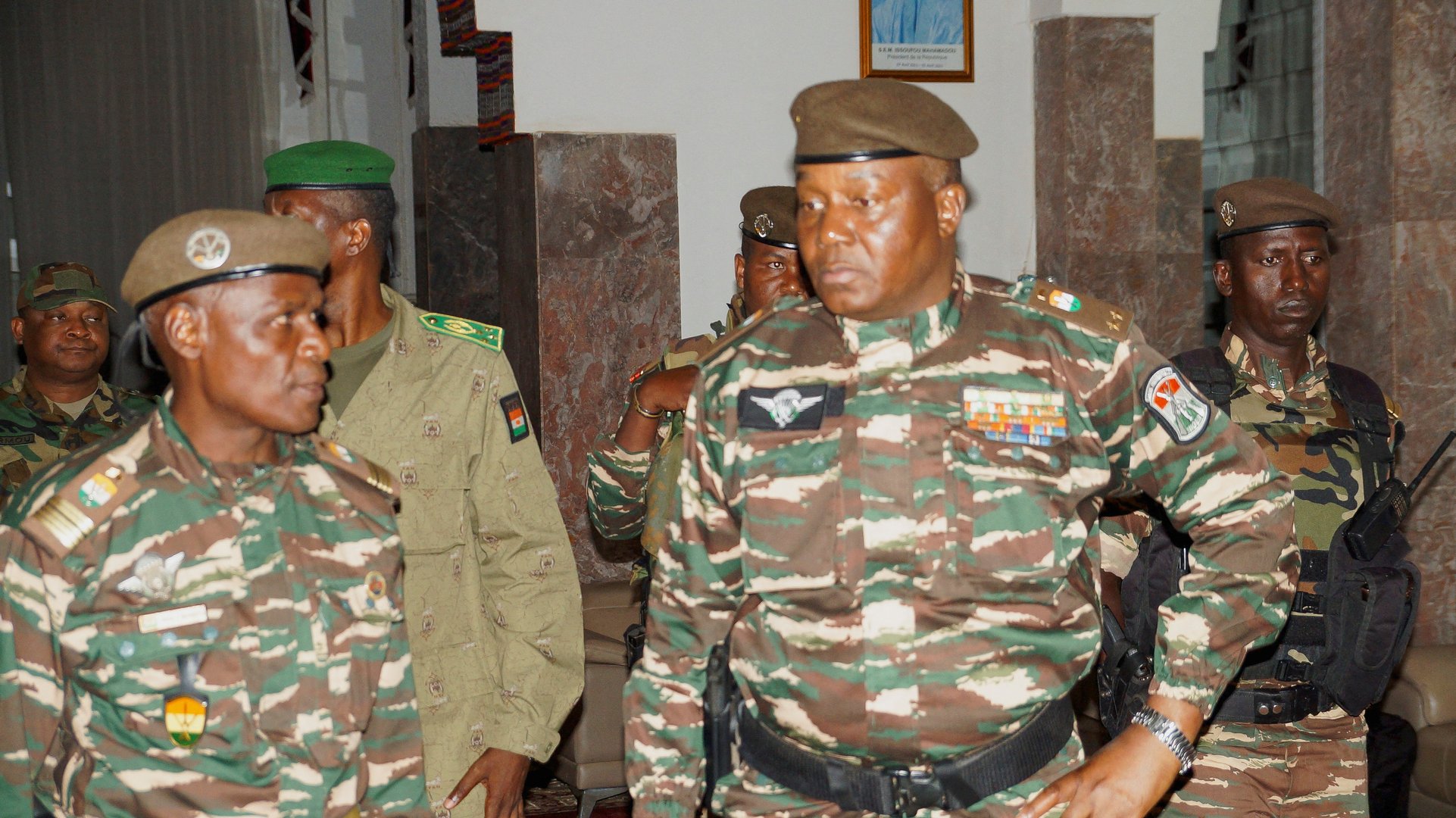The junta that seized power in Niger last week detained three more senior politicians from the ousted government on Monday, their party said, in defiance of international calls to restore democratic rule.
Following days of turmoil, the International Monetary Fund said that it was closely monitoring developments in Niger. But the IMF has not yet taken any specific actions in response to the coup.
It has yet to disburse a $131.5 million (€119.5 million) loan to Niger that was approved on July 5, it added.
The regional central bank has meanwhile cancelled Niger’s planned 30 billion CFA (€46.1 million) bond issuance, scheduled for Monday in the West African regional debt market, following sanctions, sources said.
The African Union, the UN, the European Union and other powers have condemned the junta’s overthrow of elected President Mohamed Bazoum – the seventh military takeover in less than three years in West and Central Africa.
The coup that unfolded on Wednesday has raised fears for the security of the surrounding Sahel region. The United States, former colonial power France and other Western states have troops in Niger and had been working with the government battling militant forces linked to Islamic State and al Qaeda.
Junta forces arrested the ousted government’s mines minister, the head of the ruling party, and oil minister Mahamane Sani Mahamadou, who is also the son of former president Issoufou Mahamadou, the Nigerien Party for Democracy and Socialism (PNDS-Tarayya) said.
The interior minister, transport minister, and a deputy had already been detained, it added.
The arrests confirm the “repressive and dictatorial” nature of the coup leaders, the party said in a statement, calling on citizens to come together to protect democracy.
The arrests were announced a day after Chadian President Mahamat Idriss Deby arrived in Niger to try to mediate between the coup leaders and the ousted government.
Late on Sunday he posted what appeared to be the first images of Bazoum since the takeover, showing him smiling and apparently unharmed. Deby said he was trying to “to find a peaceful solution”, without going into further detail.
West African regional bloc ECOWAS has imposed sanctions on Niger, including a halt in all financial transactions and a national assets freeze, and said it could authorise force to reinstate Bazoum, who was locked in his palace by members of his guard on Wednesday.
The EU and France have suspended financial support, while the US has threatened to do so.
ECOWAS appears to have taken a tougher stance towards Niger than its junta-led neighbours, which have been sanctioned but never threatened with force.
Both the EU and France have backed the bloc’s response.
“The EU and Niger share deep ties developed over decades. The unacceptable attack on the democratically elected government puts these ties in jeopardy,” European Commission President Ursula von der Leyen posted on X, the platform formerly known as Twitter.
On Sunday, the junta accused France of also planning to launch an operation to free Bazoum.
The French Foreign Ministry did not confirm or deny the accusation but said Paris recognised Bazoum as the only legitimate authority and was focused on protecting its own citizens and interests there.
The junta previously warned against foreign attempts to extract Bazoum, saying it would result in bloodshed and chaos.
Western concern over the coup is also sharpened by Niger’s position as the world’s seventh-biggest producer of uranium, the radioactive metal widely used for nuclear energy and treating cancer.
Niger, which is one of the world’s poorest countries and largely depends on external aid and financing, was expected to issue two other bonds in the regional market on August 7 and August 17, on top of the cancelled July issuance, according to an issuance calendar of the regional debt management agency.
The coup in Niger follows military takeovers in neighbouring Mali and Burkina Faso over the last two years, all of which have come amid a wave of anti-French sentiment. Both countries have turned increasingly towards Russia as an ally.
On Sunday, supporters of the junta burned French flags and attacked the French embassy in Niger’s capital Niamey, prompting police to fire volleys of tear gas in response.
The city appeared calm on Monday, with business and daily life returning to normal, Reuters reporters said.
France has denied responding with lethal weapons, which the junta accused it of doing.
French President Emmanuel Macron is in contact with Bazoum, Issoufou, several regional leaders and international bodies seeking to resolve the crisis, the Elysee palace said in a statement on Monday.
The coup leaders, who have named General Abdourahamane Tiani, the former presidential guard chief, as head of state, said they overthrew Bazoum due to poor governance and discontent with the way he handled the Islamist threat.
Yevgeny Prigozhin, the head of Russia’s Wagner mercenary group, last week welcomed the coup in Niger, and said his forces were available to restore order.
The Kremlin said on Monday that the situation in Niger was “cause for serious concern” and called for a swift return to constitutional order.
Germany’s foreign ministry said that the situation was still in flux, and that there was a possibility the coup could fail, echoing comments from France and the White House last week.
“We hope … that democracy can be restored, legitimacy can be restored and the president elected by the Nigerien citizens can return,” Italian Foreign Minister Antonio Tajani told the public broadcaster on Monday.







Click here to change your cookie preferences